On the Ground in Ghana – Board Member Trevor Franda visits Moree, Site of New Microfinance Program
May 19, 2024
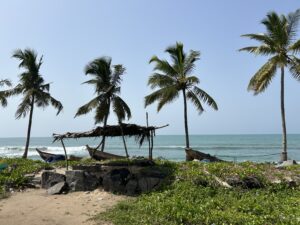
Driving down the two-lane highway that connects Ghana’s capital city of Accra with the historic city of Cape Coast, Nana Obokese picks up the phone, put it down, and tells his driver to stop the car at the side of the road. He has just seen his mother’s car passing the other direction, and we pile out into the hot, humid West-African air to wait for their arrival. His mother and sister, dressed in all white clothing in celebration of Ramadan, step out of a yellow van clad with their cosmetic company’s “Chocho Industries” logo, happily greet us to make our acquaintance.
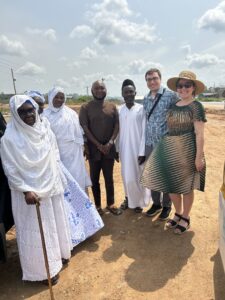
As we continue on the road, Nana again signals a stop at a roadside market with produce sent down from Niger. Fresh pineapple, cassava root, and yam stretch in all directions, and we grab a few pineapple for a snack later.
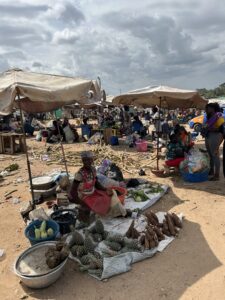 We approach Cape Coast, completing our roughly 3-hour drive from Accra, and see rows of the Ghanaian flag line the street with its green, red, and yellow stripes and black star centered in the middle, leftover from the festivities of “Ghana Month” in March, a celebration of national independence from British colonial rule as “Gold Coast”.
We approach Cape Coast, completing our roughly 3-hour drive from Accra, and see rows of the Ghanaian flag line the street with its green, red, and yellow stripes and black star centered in the middle, leftover from the festivities of “Ghana Month” in March, a celebration of national independence from British colonial rule as “Gold Coast”.
My wife Anne and I decided to visit Ghana after our friend from Minnesota invited us to travel with her as she visited family back home. Neither of us had been to Africa before, much less any developing nation, but the urge to travel to a place like Ghana has been with me ever since I began working with Wisconsin Microfinance over 10 years ago during my undergraduate years at UW-Madison. Having done quite a bit of travel to other international destinations in Europe, I was shocked to find Ghana much more chaotic and noisy than expected (particularly the traffic!), but also so welcoming and friendly. The black star of Ghana symbolizes the emancipation of Africa against colonialism, and celebration of Pan-Africanism (unity of the continent against colonial oppression).

While the effects of colonialism are without a doubt still affecting the economy and ability for Africa to thrive in international markets, native Ghanaians hold all positions of political power and black culture is alive and thriving in the streets of Accra and Cape Coast. Ghana has quickly become one of the premier destinations for tourists wishing to visit West Africa, particularly for many African-Americans interested in returning to the land where their ancestors were shipped out as slaves. Cape Coast Castle serves as a monument and brutal reminder of the abject suffering and centuries of inhuman oppression that followed the Trans-Atlantic slave trade.
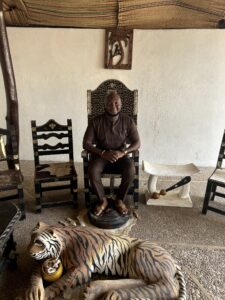 Nana Obokese Ampah, Chief of the community of Moree, brings us up to a quiet building with a large walled courtyard shaded from the beating sun with a beautiful hand-made straw roof. Home of his “Obokese Foundation” and “Obokese University of Excellence”, this is where Nana and his team work diligently to support the nearby community of Moree and the surrounding areas through entrepreneurial, business, educational, and leadership classes. On the floor is a large plaster-built curled-up tiger, and Nana sits on the throne chair with his feet resting below him on a pillow.
Nana Obokese Ampah, Chief of the community of Moree, brings us up to a quiet building with a large walled courtyard shaded from the beating sun with a beautiful hand-made straw roof. Home of his “Obokese Foundation” and “Obokese University of Excellence”, this is where Nana and his team work diligently to support the nearby community of Moree and the surrounding areas through entrepreneurial, business, educational, and leadership classes. On the floor is a large plaster-built curled-up tiger, and Nana sits on the throne chair with his feet resting below him on a pillow.
The Chiefdom community is alive and well in Ghana. It exists as a well-respected institution for community leadership, both by politicians as well as common people. The name “Nana” is the Akan/Fante expression for the ruler or chief, and Nana Obokese is the regional ruler of the community of Moree, a sprawling town just outside of Cape Coast in the historical Asebu region. Moree and the surrounding areas has a population of over 100,000 people, and is home to the historic Fort Nassau, the first Dutch trading post established in the early 17th century for engaging in the slave trade.
 Today Moree is home to a bustling fishing economy, with Nana Obokese himself to thank for much of recent rebranding efforts to be known as the “City of Light”. Driving into the town as night begins to fall, we come to a roundabout with a large bronze statue of Farnyi Kweigya, acclaimed “father of fishing”, holding a large fish.
Today Moree is home to a bustling fishing economy, with Nana Obokese himself to thank for much of recent rebranding efforts to be known as the “City of Light”. Driving into the town as night begins to fall, we come to a roundabout with a large bronze statue of Farnyi Kweigya, acclaimed “father of fishing”, holding a large fish.
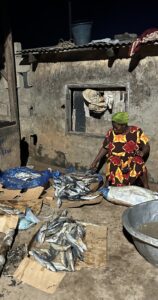 As we stroll through the dirt streets, clouds of smoke pour into the open air of the rows of tin-roofed houses. Nana has taken us here to watch the women smoking today’s catch, preserving the fish for future shipment inland to markets in Kumasi and Accra. The economy and society of Ghana’s Akan people is inherently matriarchal, where women make many of the financial decisions in the family and transfer property and inheritance rights.
As we stroll through the dirt streets, clouds of smoke pour into the open air of the rows of tin-roofed houses. Nana has taken us here to watch the women smoking today’s catch, preserving the fish for future shipment inland to markets in Kumasi and Accra. The economy and society of Ghana’s Akan people is inherently matriarchal, where women make many of the financial decisions in the family and transfer property and inheritance rights.
We talk to a few women who show us how they wash and smoke the fish, which have been caught that day and placed into the “cold storage” until they are ready to smoke.
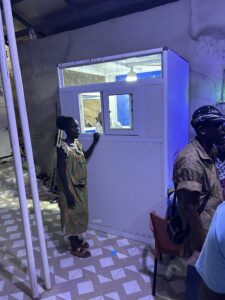

Other business activities in the community also center around fishing, including the distribution of “premix” fuel and the mending of fishing nets. However, it is also a community that needs basic services like food and beverage distribution, hair styling and fashion, and social services.
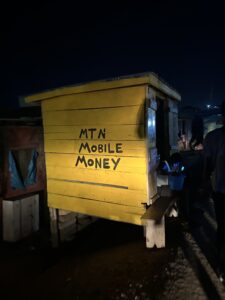
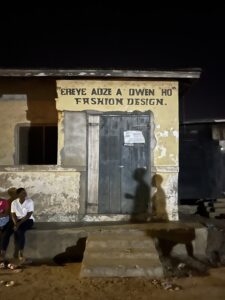
By making Wisconsin Microfinance loans available, Moree will be able to address many infrastructure problems including sanitation, flooding, street lights and road networks. There is a strong demand for these microfinance loans, which will inject much needed capital into the economy of Moree. Nana Obokese explained that he has a duty to support the citizens of his community, whose problems often center around the lack of money. If somebody gets hurt and needs surgery, there are little resources available because most people don’t have a savings funds available. More capital circulating in the community will ease this burden and make larger infrastructure projects available. Most of the construction projects in Ghana happen without capital advances like mortgages or construction loans. As a result, construction on homes and buildings only happens when a sum of money becomes available as income, and investing in construction of their property is a way to solidify these assets.
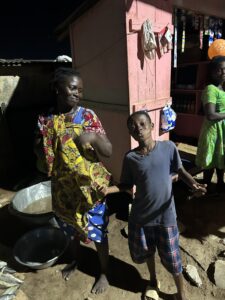 Nana Obokese is committed to developing Moree into a vibrant community. He firmly believes in the same principles of microfinance that Wisconsin Microfinance advocates for, such as lending groups, low interest rates, and loans primarily to women. His wife Sarah is a specialist in finance at the local Assinman Rural Bank in Cape Coast.
Nana Obokese is committed to developing Moree into a vibrant community. He firmly believes in the same principles of microfinance that Wisconsin Microfinance advocates for, such as lending groups, low interest rates, and loans primarily to women. His wife Sarah is a specialist in finance at the local Assinman Rural Bank in Cape Coast.
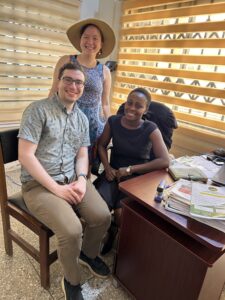 Anne and I had a chance to sit down with Sarah to discuss the details of the Wisconsin Microfinance program. Loans are currently available for the poor at this bank branch, however they are required to charge a higher interest rate than what we would be able to offer with Wisconsin Microfinance. In addition the loan applications at this bank are on the individual level – by using lending groups Wisconsin Microfinance will be able to rely on community social pressure to offer loans to people with less credit history. We will be able to rely on Sarah’s expertise to administer the loan program in Moree.
Anne and I had a chance to sit down with Sarah to discuss the details of the Wisconsin Microfinance program. Loans are currently available for the poor at this bank branch, however they are required to charge a higher interest rate than what we would be able to offer with Wisconsin Microfinance. In addition the loan applications at this bank are on the individual level – by using lending groups Wisconsin Microfinance will be able to rely on community social pressure to offer loans to people with less credit history. We will be able to rely on Sarah’s expertise to administer the loan program in Moree.
We finished our visit with Nana by receiving a gift from him – a historic wooden statue of a woman holding a basket on her head. This is a gift for Tom Eggert, president of the board at Wisconsin Microfinance, to symbolize the partnership between our organizations.
Nana then took us to a photo studio to try on some traditional Ghanaian clothing, a celebration of our appreciation for Ghanaian culture and a fun way to end our visit.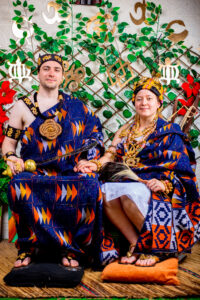
The need for capital in Ghana is great, and by targeting the community of Moree as the next destination for a Wisconsin Microfinance program we will be forging a strong partnership that will hopefully serve as a template for future Wisconsin Microfinance programs in Ghana and elsewhere on the African continent.
